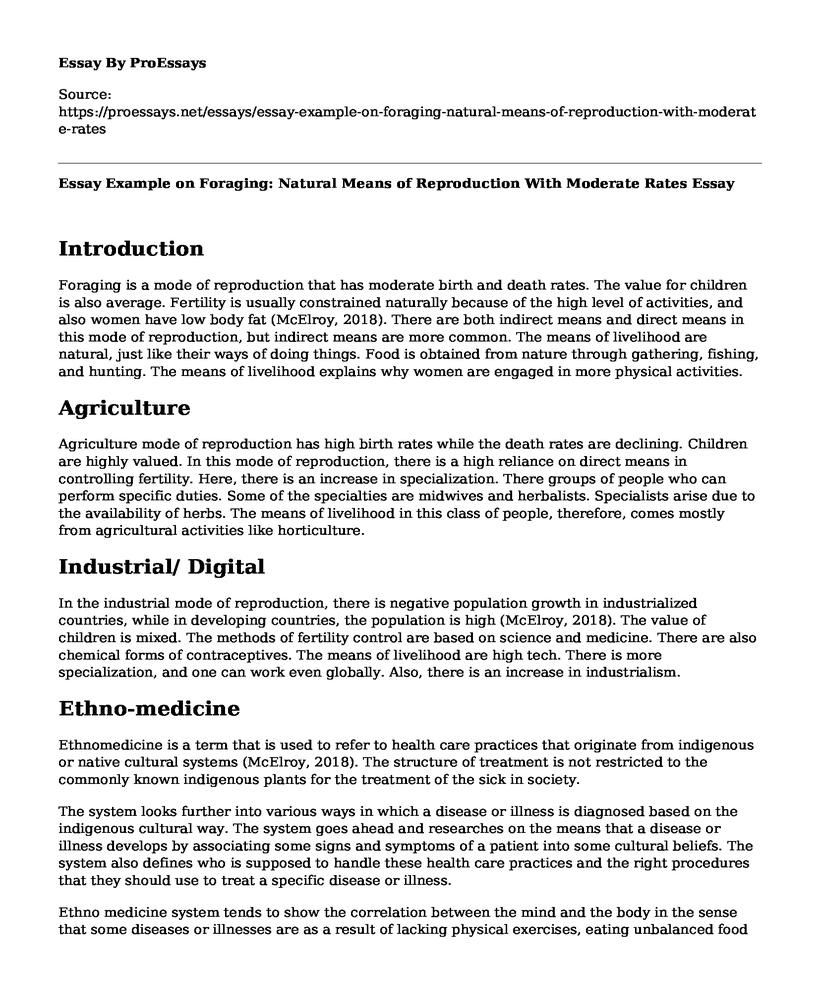Introduction
Foraging is a mode of reproduction that has moderate birth and death rates. The value for children is also average. Fertility is usually constrained naturally because of the high level of activities, and also women have low body fat (McElroy, 2018). There are both indirect means and direct means in this mode of reproduction, but indirect means are more common. The means of livelihood are natural, just like their ways of doing things. Food is obtained from nature through gathering, fishing, and hunting. The means of livelihood explains why women are engaged in more physical activities.
Agriculture
Agriculture mode of reproduction has high birth rates while the death rates are declining. Children are highly valued. In this mode of reproduction, there is a high reliance on direct means in controlling fertility. Here, there is an increase in specialization. There groups of people who can perform specific duties. Some of the specialties are midwives and herbalists. Specialists arise due to the availability of herbs. The means of livelihood in this class of people, therefore, comes mostly from agricultural activities like horticulture.
Industrial/ Digital
In the industrial mode of reproduction, there is negative population growth in industrialized countries, while in developing countries, the population is high (McElroy, 2018). The value of children is mixed. The methods of fertility control are based on science and medicine. There are also chemical forms of contraceptives. The means of livelihood are high tech. There is more specialization, and one can work even globally. Also, there is an increase in industrialism.
Ethno-medicine
Ethnomedicine is a term that is used to refer to health care practices that originate from indigenous or native cultural systems (McElroy, 2018). The structure of treatment is not restricted to the commonly known indigenous plants for the treatment of the sick in society.
The system looks further into various ways in which a disease or illness is diagnosed based on the indigenous cultural way. The system goes ahead and researches on the means that a disease or illness develops by associating some signs and symptoms of a patient into some cultural beliefs. The system also defines who is supposed to handle these health care practices and the right procedures that they should use to treat a specific disease or illness.
Ethno medicine system tends to show the correlation between the mind and the body in the sense that some diseases or illnesses are as a result of lacking physical exercises, eating unbalanced food and lack of various ingredients in the body (McElroy, 2018). Therefore, there are preventive measures taken by health practitioners, such as giving herbs, spices, and required foods to help the sick recover.
As a cultural anthropologist, one is able to maintain a good relationship among persons, the environment, the community he/she lives, and one can study animals and people as well. The second reason for being a cultural anthropologist is that one is in a situation to interact with people with whom they share a similar culture and hence get to know how people interpret their health issues.
Ways in Which Globalization Affect Health, Illness, and Healing
Globalization has been playing a significant role in the field of health. The flow of people across geographical boundaries has facilitated positively and negatively to health, illness, and healing. Doing business across borders leads to advanced communication and impacts immensely the health technology (McElroy, 2018). Globalization is highly connected to the economic growth of a country as the developing countries tend to lag behind in the global economy. The following are two ways in which globalization is affecting our health.
Improved Care in Health facilities
Globalization has increased access to high-quality medication and information through the spread of technology facilities. With access to a computer, cell phone, and electricity, people acquire knowledge and information regarding health from the internet. The internet provides data that enlighten management in the delivery of services to the sick. Medical practitioners are able to apply some knowledge in similar cases that occur to their patients. The world has become a global village. It is also possible to treat people in oversea countries.
Transmission of Infectious diseases
Globalization, despite having so many positive effects, it also has some adverse impact on health matters. Through globalization some infectious diseases have been transmitted oversees by people from one country to another. Most diseases, even after being treated, they re-emerge once again as people commute daily (McElroy, 2018). Globalization makes it difficult to control some ailments. The community healing process is thus made to be slow.The spread of diseases constrains the economy of some countries. Diseases such as AIDS have spread all over the world due to globalization. Recently Covid-19 is another epidemic that has now spread in so many countries within a short time.
References
McElroy, A. (2018). Medical anthropology in ecological perspective. Routledge.
Cite this page
Essay Example on Foraging: Natural Means of Reproduction With Moderate Rates. (2023, Apr 24). Retrieved from https://proessays.net/essays/essay-example-on-foraging-natural-means-of-reproduction-with-moderate-rates
If you are the original author of this essay and no longer wish to have it published on the ProEssays website, please click below to request its removal:
- Course Work Example: Definition and Scope of Practice of Advanced Practice Registered Nurses
- Essay Sample on Diagnosis and Treatment of Asthma
- Final Examination on Herbalism Paper Example
- How Telehealth can be Incorporated into the Surveillance System - Research Paper
- Research Paper on Unhealthy Eating Is a Behavioural Problem Among Truck Drivers
- Firefighters: Mental & Physical Skills to Handle Disasters - Research Paper
- Central Achromatopsia: Color Blindness in Toddlers - Essay Sample







